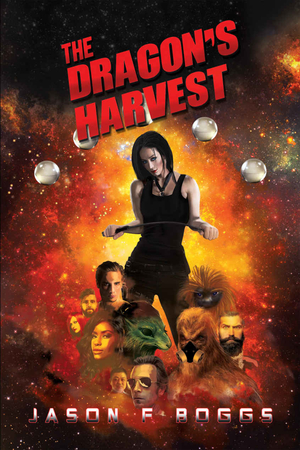Once the boundaries of reality are broken, authors have a seemingly unlimited space to play, and author Jason F. Boggs certainly takes advantage of that in his writing. His latest book, The Dragon’s Harvest, the second installment of The Dragon Trilogy, is complete with moral dilemmas, space battles, savage dialogue and extraordinary characters that will expand your definition of strange.
Nearly a century in the future, the world is a very different place, and was recently controlled by a fascist New Era regime that sought complete control, by whatever means necessary, in order to protect against the alien threat. After helping to topple the New Era in the first book in this series, Nelson Jones remains at the center of the action, and his complex, high-energy presence carries this story through even its slowest moments.
Still wrestling with his demons of loyalty, power and betrayal, Nelson’s courage and fortitude stand out, despite being embattled from every side. He is also the platform where most of the larger, heady questions of right and wrong are presented by the author, making his character the crux of this entire trilogy.
However, Nelson is not the only fascinating character. His old nemesis, Ira Bilis, might have fallen from power, but she is still a wickedly cruel and clever enemy. Boggs spends a great deal of time exploring her psyche, which is unusual for a “bad guy” in a novel of this genre, but that is the odd beauty of this novel. Traditional definitions of good and evil begin to break down when you are observing a world so different from our present reality. Ira Bilis is an oddly likable antagonist, one who revels in her dark work and sincerely believes in her mission. Defining her simply as “evil” cheapens the existential questions this book tries to pose. The time and attention that Boggs puts into Ira make her as important and complex as Nelson Jones.
In terms of the writing, some of the action scenes become repetitive, particularly in terms of word use. Similarly, some of the dialogue is quite procedural and leading, more designed to progress the plot than to reflect the natural flow of conversation. Some of this awkwardness can be attributed to speaking with alien species and inhabiting distant worlds, but heavy-handed dialogue is noticeable in any context. Additionally, some of the scenes tend to jump too rapidly, and while that can occasionally work for the book’s momentum, there is a disjointed feeling when a scene is interrupted with another short anecdote, which sometimes affects the pace and flow of the book.
That said, the word choice and the creative descriptions throughout the book reveal a deep love of language, and Boggs does a great job capturing the essence of different species and worlds, which makes for a very enjoyable book overall – one that could be even better with some tightening of the language, syntax and dialogue. Dark and wildly imaginative, The Dragon’s Harvest is not your typical work of science fiction.
Book Links
STAR RATING
Design
Content
Editing
Get an Editorial Review | Get Amazon Sales & Reviews | Get Edited | Get Beta Readers | Enter the SPR Book Awards | Other Marketing Services
























Leave A Comment